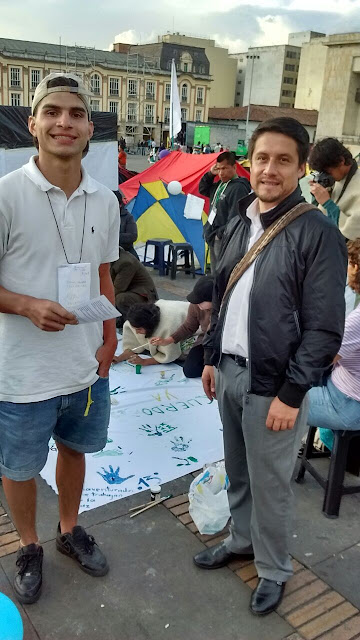The recent
announcement of the final agreements between the government of Colombia and the
FARC (Revolutionary Armed Forces of Colombia) is exciting news. The Evangelical
Lutheran Church of Colombia (IELCO) and all affiliated organizations and
ministries have been working for decades to build peace and look forward to the
next stage in this long and arduous journey. What are the perspectives of
Lutheran Colombians on the peace agreements and hopes for the future of their
country?
The
plebiscite, where the Colombian people will have the opportunity to vote “yes”
or “no” the agreement, will be held on October 2nd. Between now and
then we will be highlighting the voices of our Colombian Lutheran brothers and
sisters and their perspectives on the agreement.
This week,
Andres Alba, Technical Secretary for the Inter-Church Dialogue for Peace
(DIPAZ) and member of the Evangelical Lutheran Church of Colombia (IELCO).
 |
| Andres Alba in a workshop about the peace proccess, photo credit: submitted by Andres Alba |
I took a
taxi to work a few days ago. The driver and I talked the whole ride; the
subject “yes” or “no” on the plebiscite for peace. First I listened to his
worries about the Final Agreement; it is difficult to read the “fine
print”, he said, and it is difficult to think of a guerrillero participating
in politics. I tried to argue with him about what it means to “stop killing
ourselves” (a popular campaign slogan) and to start peace-building from the
grassroots without armed mediation from whichever armed actor. I specified that
the implementation of the agreement between the FARC and the National
Government is the work of all of the Colombian society. I insisted on the
centrality of the conflict’s victims in the agreements, the transitional
character of the agreements, as well as the restorative justice approach that
has sustained the dialogue. I also tried to clarify that in no part of the
agreements does anything similar to a “gender ideology” appear, only a gender
focus for a necessary justice which is intended to be democratic for everyone.
The taxi
driver respectfully stayed strong with his “no”. Finally, I asked him if he is a believer. He told me
yes with enthusiasm. Then I brought up that biblical memory about Jesus’
arrest, where Peter reacts: “Then Simon Peter, who had a sword, drew it and
struck the high priest’s servant, cutting off his right ear. (The servant’s
name was Malchus.) Jesus commanded Peter, “Put your sword away! Shall I not
drink the cup the Father has given me?” (John 18: 10-11).
I told him
that for me to say “yes” on the plebiscite was a way to affirm the modern
necessity to “put your sword away”. It will be fundamental to build peace
together without denying our political differences or killing ourselves because
of them. I managed to say: “we should do as Jesus, bet on or choose nonviolent action”.
Then the
taxi driver, a man already advanced in age, without needing to, slowed down the
cab and told me: “I was a soldier and I know what war is. I had not realized
that Peter was armed. True, Jesus invites us to sheathe our sword. Of course,
the zealots were present in Jesus’ times”.
The zealot
spirit, I reminded him, encouraged the most violent faction of Judaism in the
time of Jesus, The Zealots. That spirit tried to permeate the movement. Is it a
coincidence that Peter had a sword with him or one of the twelve is called
Simon the rebel (zealot: Lucas 6: 15) or that his disciples, in front of the
mob at Jesus’ arrest, say: “Lord, should we strike with our swords”? I
continued, saying: It may be that the plebiscite is a necessary step to pass
through the cross and await the resurrection? What do you think? I asked him.
He told me: “Let’s go for peace”.
I told him,
with one foot on the sidewalk and the other in the taxi, for me the plebiscite
is not the fundamental thing, but it is an important chance to claim my right
to peace, as well as the right of my son, Gabo.
I closed the
taxi door and felt the many dead left by this war. I thought about the
necessity to “stop killing ourselves” and the unique opportunity we have in
this country. And I asked myself: Why not say yes to a Final Agreement
that truly will require all our service and commitment to ensure its
implementation? Why not disarm ourselves as Christians and as disciples of
Jesus and say yes to this peace process which becomes yes to the plebiscite?



























